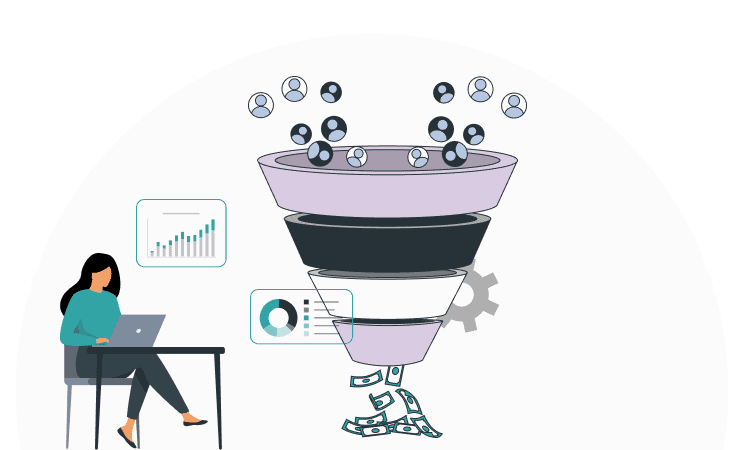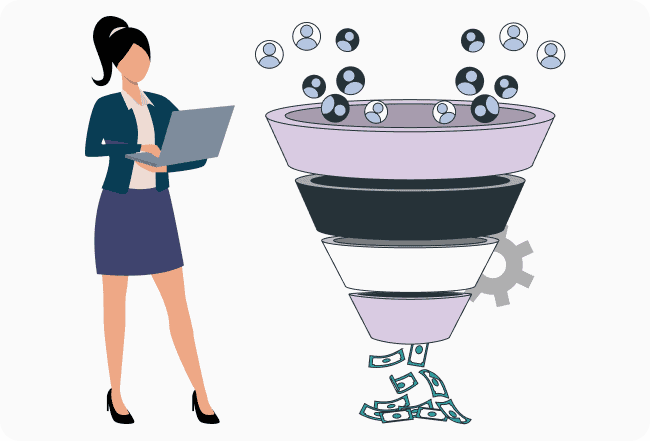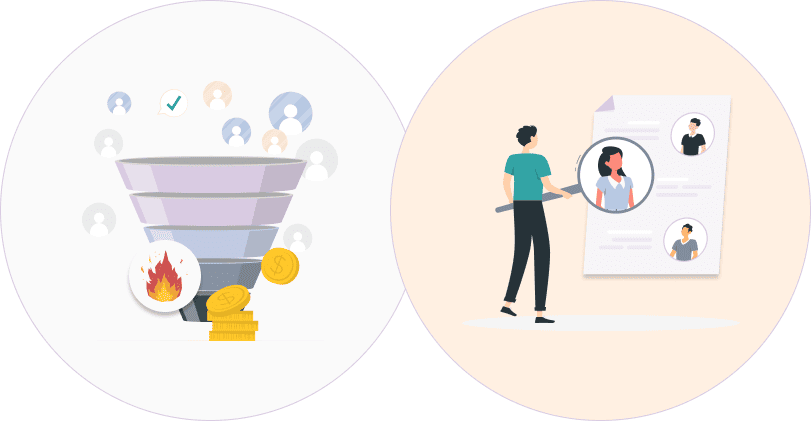

In sales, hot leads are potential customers or prospects that have shown a strong interest in your brand, product or service. They show a high probability of conversion and are considered to be in the final stage of the buyer’s journey. These are leads that are further along in the sales funnel and has given strong intent signals to buy from you.
In marketing, hot leads are typically prospects that have shown a strong interest in your products or services through high levels of engagement on your marketing channels.
Whether they convert to customers or not, they are very likely to keep coming back to these channels to interact with your brand until a buying decision is made. This gives you ample opportunity to increase the chances of conversion.
Warm leads are prospects that have shown some interest in your product or service but may not have a strong inclination to purchase yet.
Hot leads are prospects that are highly interested and likely to make an immediate purchase or decision.
Here’s a thorough breakdown of what sets apart hot leads from warm leads.
| Warm Leads | Hot Leads | |
|---|---|---|
| Interest Level | Moderate interest in the brand, product or service. | High level of interest and readiness to make a purchase. |
| Engagement | Have shown some engagement with marketing materials. | Have actively engaged with recent marketing efforts. |
| Actions | May have taken initial steps like signing up for a newsletter or downloading content. | Have taken significant actions like requesting a quote, signing up for a trial, or requesting a demo. |
| Timing | Could be considering a purchase in the future, but not immediately. | Likely to make a purchase decision soon. |
| Follow-up | Require nurturing to move closer to a buying decision. | Require immediate, personalized attention from the sales team. |
Hot leads make themselves obvious, if you’re looking in the right places.
These are some of the characteristics of hot leads to help you identify hot leads in your sales or marketing channels.
Leads that closely match your ideal customer profile in terms of industry, company size, or other relevant demographics.
A study by Gleanster Research reports that only 25% of qualified leads are high enough quality to convert.
While qualifying leads through sales or marketing, it’s important to distinguish hot leads from the warm and cold ones to truly boost your chances of conversion.
The following questions can be used in the qualifying process to identify hot leads.
Even if a lead is hot, it still requires segmentation for a personalised engagement. The following are some common classifications of hot leads you’ll encounter.

These leads are ready to make a purchase almost immediately. They may have already done thorough research, know exactly what they need, and are in the final stages of decision-making.

Leads who have signed up for a trial of your product or service want to experience the offering firsthand, making them more likely to convert.

Leads who request a product demonstration or consultation are actively seeking a deeper understanding of how your solution can meet their needs.

These leads have expressed interest in the pricing details of your product or service. They are likely evaluating the cost and comparing it to the value they expect to receive.

A lead scoring system, based on interactions like opening emails, visiting your website, and engaging with your content, can help you determine high-priority or hot leads.

Leads who consistently engage with your email campaigns, newsletters, and other content, demonstrating an active interest are prospective hot leads.

Leads that come through referrals, especially from happy existing customers or affiliate partners, often have a higher level of trust and are more likely to convert.

Leads who have downloaded high-value content like ebooks, whitepapers, or case studies, are likely interested in understanding of your product/service and may be moving towards a purchase decision.

Leads who have expressed a sense of urgency in their decision-making process are considered hot. They may have immediate requirements for a solution like yours.
There are several ways to generate hot leads. From using your own channels or hiring exceptional sales development representatives to building high-quality prospecting lists.
Here are several effective strategies to attract and engage prospects that are most likely to convert.
Clearly identify the key characteristics of your ideal customers, including demographics, industry, company size, revenue size, tech stack and specific needs. This lets you segment your leads and target those whose needs align with your solutions.
Implement an Account-Based Marketing strategy for highly targeted and personalized campaigns focus on specific companies or decision-makers.
Create high-quality, valuable content that addresses the pain points and needs of your target audience. This includes articles, ebooks, whitepapers, newsletters and other resources that establishes the authority of your brand.
Implement interactive content to engage leads and gather valuable information about their preferences and needs.
Actively engage with your audience on social media platforms. Share relevant content, participate in conversations, and leverage social media advertising to reach and attract potential hot leads.
Use video marketing and storytelling to highlight your value proposition and enhance your online visibility. Integrate CTA elements directing viewers to take an action like subscribing or visiting your website.
Build and segment your email lists based on lead behaviour and preferences. Segment your audience based on various criteria, such as behaviour, location, or industry.
Use targeted email campaigns with personalized marketing messages to nurture leads, provide valuable information, and move them through the sales funnel.
Create dedicated landing pages with 1-2 prominent and compelling calls-to-action (CTAs) that encourage visitors to take specific actions, such as downloading a resource, signing up for a trial, or requesting more information.
Include social proof elements like customer testimonials, reviews, awards and trust badges to build credibility and put yourself ahead of your competitors.
Offer lead magnets, such as free trials, exclusive content, or discounts, to incentivize visitors to provide their contact information. These offers can attract leads who are genuinely interested in your products or services.
Use chatbots or live chat on your website to engage with visitors in real-time and address questions, provide information, and capture leads.
Encourage satisfied customers to refer others by implementing a referral program. Word-of-mouth referrals often bring in leads that are already positioned to trust your brand.
Your existing customers are your best source of hot leads. Provide clear incentives to both existing customers and new buyers or users for purchasing through a referral link. Create a tracking and rewards system for added motivation!
Utilize targeted paid advertising on platforms like Google Ads or social media to reach specific demographics and interests. Ensure your ad copy and visuals are compelling and aligned with your target audience.
Use advanced targeting options in your advertising platform to target specific audiences based on your ideal customer profiles. Ensure your ads are A/B tested for optimal impact.
Implement retargeting ads to re-engage visitors who have previously interacted with your website but did not convert. This keeps your brand in front of potential leads and encourages them to take the next step.
Offer incentives like limited-time deals or special offers to motivate users to come back and complete their buying journey.
Collaborate with other businesses or influencers or affiliates in your industry with complementary products for a shared target demographic.
This can include co-branding, cross-promotion on social media, hosting join webinars and events, and establishing clear strategic objectives with your partners. This can organically expand your reach to a wider audience, giving you access to hot leads.

Hot leads and Sales Qualified Leads (SQLs) are terms used to describe leads at different stages of the buyer journey.
Qualifying leads is a process in the sales or marketing process where leads are deemed ready for direct sales engagement based on specific criteria including the lead’s fit with the target customer profile.
Qualified leads can still be cold, warm or hot leads. With each criterion satisfied with further sales and marketing effort, these leads become warmer. If they do not fit these criteria, they are dead-end leads that are not progressed further through the sales funnel.
There are two types of qualified leads: Sales Qualified Leads and Marketing Qualified Leads. SQLs are typically further along in the sales funnel than MQLs but may still require additional nurturing or information before closing the deal.
Hot leads refer to potential customers who have shown a high level of interest and are more likely to make an immediate purchase or take a desired action.
Cold leads are prospects who have shown minimal interest and awareness, while hot leads are actively engaged, displaying immediate interest and a higher likelihood of conversion. Hot leads are closer to making a purchasing decision compared to cold leads.
Hot leads for business are individuals or organizations that have demonstrated a strong intent to purchase or engage with a product or service. These leads are considered highly qualified and are more likely to convert into customers.
Finding hot leads involves implementing targeted marketing strategies, leveraging customer data and analytics to identify engaged prospects, utilizing referral programs, optimizing landing pages, and employing lead scoring systems to prioritize prospects indicating strong buying signals.
Examples of hot leads include individuals who have requested a product demo, initiated a trial, actively engaged with pricing information, filled out a contact form expressing immediate interest, or attended a webinar showcasing a product or service. These actions indicate a high likelihood of conversion.